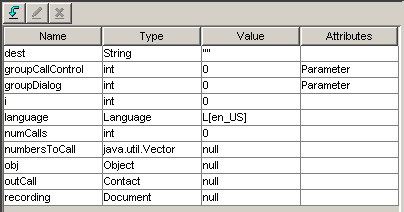Script Variables for broadcast.aef
Begin the broadcast.aef script design process by using the Variable pane of the Cisco Unified CCX Editor to define script variables.
Note | For more information about defining variables, see the Defining, Using, and Updating Script Variables section. |
Figure shows the variables of the broadcast.aef script as they appear in the Variable pane of the Cisco Unified CCX Editor window.

The following table describes the variables used in the broadcast.aef script.
|
Variable Name |
Variable Type |
Value |
Function |
|---|---|---|---|
|
dest |
String |
"" |
Stores the current destination number to call as the script loops. (See The Call Subflow Step.) |
|
groupCallControl |
Integer |
0 |
ID of the Call Control Group with which the outbound call is associated. (See The Place Call Step.) Mark this variable as a parameter to allow the administrator the option to change the value of this variable. For more information, see the Cisco Unified Contact Center Express Administrator Guide. |
|
groupDialog |
Integer |
0 |
identifies the ID of the primary dialog group for handling the outbound call. (See The Place Call Step.) Mark this variable as a parameter to allow the administrator the option to change the value of this variable. For more information, see the Cisco Unified Contact Center Express Administrator Guide. |
|
i |
Integer |
0 |
Stores the current index of the number to call. (See The If Step.) |
|
Language |
language |
L[en_US] |
Sores the value of the local language used for prompts. |
|
numCalls |
Integer |
0 |
Stores the number of calls to be made. (See The Set numCalls Step.) |
|
numbersToCall |
Java Type |
null |
Stores all the numbers to call. (See The Set numbersToCall Step.) |
|
obj |
Java Type |
null |
Holds the current destination object as it loops through. This object is then typecast to a string that represents the number to call (outCall). (See The Set Steps) |
|
outCall |
Contact |
null |
Stores the contact information returned when the Place Call step succeeds. (See The Place Call Step.) |
|
recording |
Document |
null |
Stores the audio document that the caller records. (See The Recording Step.) |